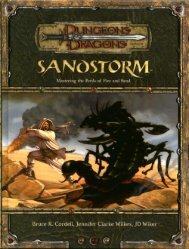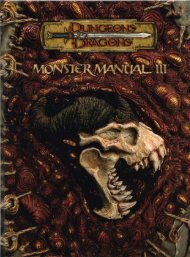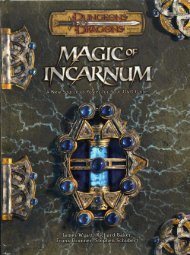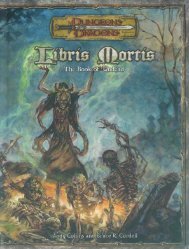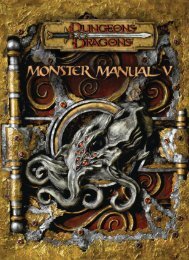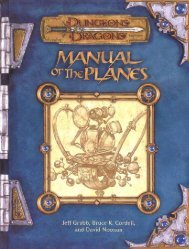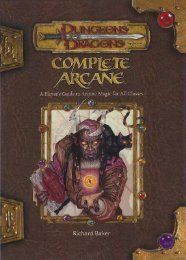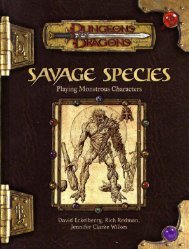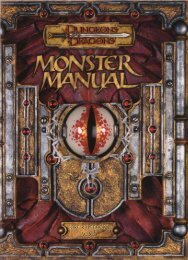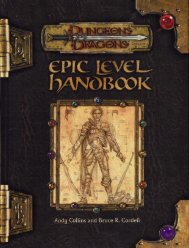CHAPTER 5PRESTIGECLASSESIllus. by W. England110PLAYING AN ARCANE HIEROPHANTThink deeply, but creatively. Your character relies on adeep understanding <strong>of</strong> magic and nature for his powers.He didn’t get where he is, however, by thinking inside thebox. He has forged his own way by melding two distinctmagical traditions to create a potent new whole. Yourthoughts and actions should reflect that blending <strong>of</strong> natureand magic.Avoid emotion and excess.Nature wastes nothingand proceeds withoutemotion or sentimentality.You need not be dour,but calm deliberationsuits your character betterthan recklessness or a volatiletemper. Be wary <strong>of</strong> unexpectedresults and unintended consequencesfrom your actions.Take risks if you must, butstick to calculated risks.When you ponderan action, knowwhat you’re likelyto achieve if successfuland whatyou’re likely to loseif you fail. Reject courses<strong>of</strong> action that expose youto losses greater than yourpotential gains.Be persistent. In time, thewind can wear away a mountain,so don’t get discouraged whenthings don’t go your way. Still,strike hard when you can. Astroke <strong>of</strong> lightning cleaves awayrock faster than sand blown on the wind.Show reverence for nature’s beauty and bounty.Oppose the wanton destruction <strong>of</strong> natural placesand objects.An arcane hierophant uses hischannel plant ability to make alightning bolt erupt from a treeCombatYour wild shape ability can make you an effective combatantwhen the need arises, but your strength lies in your spells,and you don’t have the Armor Class or hit points to fight inthe front line all the time. Your combination <strong>of</strong> arcane anddivine spellcasting ability gives you access to all the <strong>of</strong>fensivespells you’re likely to need, so don’t forget to prepare a variety<strong>of</strong> utilitarian spells that provide you and your party withhealing, information gathering, and mobility.AdvancementArcane hierophant circles usually keep a close watch onany potential new members operating in or near theirareas. They pay special attention to characters who chooseon their own to multiclass as druid/wizards (recognizingkindred spirits), but they <strong>of</strong>ten study and secretly groomany spellcasters who show an interest in nature. They mayapproach such characters with opportunities for adventuringin the wild, such as tracking and rescuing captives,intercepting raids, or even locating and propagating rareplants and animals.Once accepted into a circle (see Organizations, below), anew arcane hierophant is expected to continue his divineand arcane studies, maintain and defend the circle’s citadel,and undertake such missions as might become necessaryto maintain the circle’s integrity.These might includereconnaissance missions (todetermine the whereaboutsand intentions <strong>of</strong> potentialenemies), diplomatic missions,and seeing to theprotection and training <strong>of</strong>prospective new recruits tothe circle.If you have theability to wild shape,many options openup for you. The abilityis good for fighting, butyou also can fly, swim,and even pass throughsolid ground when inelemental form, makingyou an excellentscout and infiltrator.Don’t forget to take theNatural Spell feat in order tobe able to use your formidablespellcasting abilities whileusing wild shape.Don’t overlookthe tactical possibilitiesthat your channelpower gives you. You can literally cast spells around cornersthough the use <strong>of</strong> this ability. You may need to combine itwith some divination to get a decent idea <strong>of</strong> where yourspell is aimed.ResourcesAs a member <strong>of</strong> a circle, you have access to the circle’s citadel.Many citadels are little more than secret hideouts whereyou can stay for a night or two in reasonable safety. Moreinfluential and powerful circles have citadels that containlibraries and laboratories for your use and a staff <strong>of</strong> servantsand guards for assistance and protection.Membership in a circle brings you in contact with othercharacters who share your ideals and your commitmentto nature and to magic and who might be available to
accompany you on adventures. A circle may include wildrunners,druids, rangers, wizards, and maybe even somemid- to high-level barbarians. Such characters generallyhave starting attitudes <strong>of</strong> friendly toward you but willexpect some sort <strong>of</strong> compensation (such as a little cash upfront and a cut <strong>of</strong> the proceeds after the adventure). Thesecharacters might help you in other ways such as castingspells for you or even creating items. You’ll still have topay the going rate for such services, but at least word <strong>of</strong>what you’re doing won’t spread beyond the circle. Likewiseif you’re strapped for cash you might purchase servicesor items in return for your own labor (or for a favor to benamed later).ARCANE HIEROPHANTSIN THE WORLDIf the PCs get involved in the diplomacy, politics, or trade thatpasses between different groups in the wild, they’ll eventuallymeet arcane hierophants—though they might not recognizethem for what they are. To the casual observer, there’s notmuch difference between an arcane hierophant and a druidor wizard. When you need an inscrutable character to conveyinformation, render aid, or launch a magical attack in thewilderness, an arcane hierophant (or a whole circle <strong>of</strong> them)can serve very well indeed.OrganizationArcane hierophants band together in groups called circles.A circle traditionally has at least seven members (thoughin theory even a single arcane hierophant might establisha circle) and seldom more than two dozen members (notincluding guards and servants). Each circle maintains asecret retreat, called a citadel, where the members can meet tostudy, train, and discuss matters <strong>of</strong> mutual interest. A citadelis usually located in an area <strong>of</strong> great natural beauty, suchas a mountain valley, sylvan glade, or island. Some circles,however, operate within cities, and their citadels might belocated near waterways, gardens, or markets where produceor other natural products are sold.Most circles value their privacy, but they don’t take greatpains to conceal their existence (though they invariably keepthe location <strong>of</strong> their citadel secret). Some circles operatepublicly and others covertly, as their members prefer.Each circle has a leader, usually called the speaker,chosen for his magical accomplishments, leadership skills,and persuasiveness. A speaker is <strong>of</strong>ten, but not always,the most powerful spellcaster in the circle. Beyond that,a circle has no formal organization, though an informalhierarchy based on seniority and merit develops in wellestablishedcircles.Circles usually have no formal names. For convenience,the members choose some fairly meaningless name or simplyadopt the name <strong>of</strong> the circle’s founder or one <strong>of</strong> its morefamous members. Circle members avoid names based on thelocation or appearance <strong>of</strong> their citadel, because that informationis supposed to be secret. Typical circle names include TheFellowship <strong>of</strong> Cymbeline, Servants <strong>of</strong> the Harvest, Friends<strong>of</strong> the Highwood, and Syngil’s Watchers.The only circle member with any real duties is the speaker,who keeps track <strong>of</strong> the other members and their doings, staysin contact with other circles, and sees to it that someone(<strong>of</strong>ten the speaker himself) maintains the citadel and trainsnew members.Many arcane hierophants (especially halflings and adventurers<strong>of</strong> all kinds) become associated with several differentcircles as they roam about. These itinerant members almostnever serve as speakers; they move from citadel to citadel,exchanging news with the local arcane hierophants andtaking on any tasks for which a relative outsider might bewell suited. The Circle <strong>of</strong> the Open Road provides a notableexception to this rule: It is a mobile circle in which halflingsmake up most <strong>of</strong> the membership. Their speaker, a tallfellowhalfling called Feideal Chestnutsower, is known for his love<strong>of</strong> roasted chestnuts and his penchant for planting chestnuttrees wherever he goes.NPC ReactionsArcane hierophants provoke a wide variety <strong>of</strong> reactions,depending on their own actions and the ideals and prejudices<strong>of</strong> the people they meet.A known member <strong>of</strong> a circle <strong>of</strong>ten stands in high regardamong commoners in the area where the circle is located,especially if the circle has been active in defending the area,dealing with natural disasters, or giving support and advice.Such commoners will have an indifferent starting attitudeat worst.Not all circles are benign, however, and local folk probablyhave an unfriendly or even hostile starting attitudewhen a circle has been acting contrary to their interests,such as interfering with attempts at settlement, breeding orintroducing predatory animals, or disrupting activities suchas mining or woodcutting.Many druids look upon arcane hierophants as dabblers inthe ethos <strong>of</strong> the druid and are indifferent at best. Some druidslook upon arcane hierophants as heretical or iconoclasticbecause <strong>of</strong> their mingling <strong>of</strong> nature and magic. The majorpoint <strong>of</strong> disagreement is how arcane hierophants thinkabout nature and magic. They see both as forces that canbe understood and manipulated, an idea many druids finddeeply <strong>of</strong>fensive. These druids usually prove hostile to thearcane hierophant circle.Other druids regard arcane hierophants as kindred spiritsand tend toward friendly starting attitudes upon meetingthem. These druids may become allies or even members <strong>of</strong>an arcane hierophant circle.Rangers and bards usually respect arcane hierophants fortheir knowledge and magical powers.ARCANE HIEROPHANT LORECharacters with Knowledge (arcana) or Knowledge (nature)can research the arcane hierophants to learn more aboutthem. When a character makes a skill check, read or paraphraseCHAPTER 5PRESTIGECLASSES111
- Page 2:
C R E D I T SD E S I G NSKIP WILLIA
- Page 7 and 8:
no elf could predict which memory w
- Page 9 and 10:
premium. Thus, each individual can
- Page 11 and 12:
The elves have raised one form of e
- Page 13 and 14:
do spend time away from one another
- Page 15 and 16:
espects during this time, and those
- Page 17 and 18:
Stores Master: Charged with keeping
- Page 19 and 20:
would be the birthright of any full
- Page 21 and 22:
of feet above the forest floor. Mos
- Page 23 and 24:
Cleric Training: More than any othe
- Page 25 and 26:
ELF HISTORYAND FOLKLOREThe elves cl
- Page 27 and 28:
along with her son Hionyron, who wa
- Page 29 and 30:
and return her to her people.” In
- Page 31 and 32:
Table 1-3: Suffixesd% Suffix Meanin
- Page 34:
CHAPTER 1ELVES34tri-level tree home
- Page 37 and 38:
Illus. by C. Lukacsurious and activ
- Page 39 and 40:
the reason for the farmer’s hospi
- Page 41 and 42:
Halflings make a visitor feel welco
- Page 43 and 44:
Halflings are usually pleasant trav
- Page 45 and 46:
Halflings are as eager to experienc
- Page 47:
A chief or elder heads each clan, c
- Page 50 and 51:
CHAPTER 2HALFLINGS50away from their
- Page 52 and 53:
CHAPTER 2HALFLINGS52Illus. by S. Wo
- Page 54 and 55:
CHAPTER 2HALFLINGS54to tell how lon
- Page 56 and 57:
CHAPTER 2HALFLINGS56the underbrush
- Page 58 and 59:
CHAPTER 2HALFLINGSIllus. by T. Baxa
- Page 60 and 61: CHAPTER 2HALFLINGS60Donta muden sit
- Page 63 and 64: and one or more bedrooms. All have
- Page 65 and 66: Illus. by C. Lukacshe cliff-dwellin
- Page 67 and 68: Personality: Raptorans have a reput
- Page 69 and 70: PSYCHOLOGYSome outsiders who have h
- Page 71 and 72: for making a point through a logica
- Page 73 and 74: flock for debate, sometimes invitin
- Page 75 and 76: its eggs. At such times, they toler
- Page 77 and 78: THE RAPTORAN PANTHEONThe typical ra
- Page 79 and 80: Prayers: Prayers to the Stormfather
- Page 81 and 82: “Welcome, friend,” said a human
- Page 83 and 84: year since, and they share the care
- Page 85 and 86: D: Domain spell. Domains: Protectio
- Page 87 and 88: characteristics are summarized in t
- Page 90 and 91: CHAPTER 3RAPTORANS90Authority Figur
- Page 92 and 93: CHAPTER 4OTHERRACES92a humanlike ra
- Page 94 and 95: CHAPTER 4OTHERRACES94ment, finding
- Page 96 and 97: CHAPTER 4OTHERRACES96Illus. by S. B
- Page 98 and 99: Table 4-1: The CentaurHit Base Atta
- Page 100 and 101: CHAPTER 4OTHERRACES100nomadic gnoll
- Page 102 and 103: Table 4-2: The GnollBase Fort Ref W
- Page 104 and 105: CHAPTER 4OTHERRACES104of the humano
- Page 106 and 107: CHAPTER 4OTHERRACESsneak attack, bu
- Page 108 and 109: CHAPTER 5PRESTIGECLASSES108Shadowda
- Page 112 and 113: CHAPTER 5PRESTIGECLASSES112the foll
- Page 114 and 115: CHAPTER 5PRESTIGECLASSES114Entry Re
- Page 116 and 117: CHAPTER 5PRESTIGECLASSESIllus. by J
- Page 118 and 119: CHAPTER 5PRESTIGECLASSESLUCKSTEALER
- Page 120 and 121: CHAPTER 5PRESTIGECLASSESIllus. by J
- Page 122 and 123: CHAPTER 5PRESTIGECLASSESEL 11: Kuly
- Page 124 and 125: CHAPTER 5PRESTIGECLASSES124spellcas
- Page 126 and 127: CHAPTER 5PRESTIGECLASSES126save bon
- Page 128 and 129: CHAPTER 5PRESTIGECLASSESmore than o
- Page 130 and 131: CHAPTER 5PRESTIGECLASSES130raptoran
- Page 132 and 133: CHAPTER 5PRESTIGECLASSES132Table 5-
- Page 134 and 135: CHAPTER 5PRESTIGECLASSESfriendly—
- Page 136 and 137: CHAPTER 5PRESTIGECLASSESYou no long
- Page 138 and 139: CHAPTER 5PRESTIGECLASSES138small fe
- Page 140 and 141: CHAPTER 5PRESTIGECLASSES140ranger.
- Page 142 and 143: CHAPTER 5PRESTIGECLASSESIllus. by T
- Page 144 and 145: CHAPTER 5PRESTIGECLASSESEncountersP
- Page 146 and 147: CHAPTER 6CHARACTEROPTIONS146Conditi
- Page 148 and 149: CHAPTER 6CHARACTEROPTIONS148If the
- Page 150 and 151: CHAPTER 6CHARACTEROPTIONSIllus. by
- Page 152 and 153: CHAPTER 6CHARACTEROPTIONSIllus. by
- Page 154 and 155: CHAPTER 6CHARACTEROPTIONSIllus. by
- Page 156 and 157: Table 6-3: Elf Ranger Racial Substi
- Page 158 and 159: Table 6-5: Halfling Druid Racial Su
- Page 160 and 161:
CHAPTER 6CHARACTEROPTIONS160Table 6
- Page 162 and 163:
Class SkillsRaptoran fighter substi
- Page 164 and 165:
CHAPTER 7EQUIPMENTAND MAGICIllus. b
- Page 166 and 167:
CHAPTER 7EQUIPMENTAND MAGIC166anoth
- Page 168 and 169:
CHAPTER 7EQUIPMENTAND MAGICTable 7-
- Page 170 and 171:
CHAPTER 7EQUIPMENTAND MAGICIllus. b
- Page 172 and 173:
CHAPTER 7EQUIPMENTAND MAGICIllus. b
- Page 174 and 175:
2nd-Level Ranger SpellWoodland Veil
- Page 176 and 177:
WOODLAND VEILIllusion (Glamer)Level
- Page 178 and 179:
CHAPTER 8CAMPAIGNS INTHE WILD178THE
- Page 180 and 181:
CHAPTER 8CAMPAIGNS INTHE WILDIllus.
- Page 182 and 183:
CHAPTER 8CAMPAIGNS INTHE WILD182(lo
- Page 184 and 185:
CHAPTER 8CAMPAIGNS INTHE WILD184Ski
- Page 186 and 187:
CHAPTER 8CAMPAIGNS INTHE WILD186Tab
- Page 188 and 189:
CHAPTER 8CAMPAIGNS INTHE WILDIllus.
- Page 190 and 191:
CHAPTER 8CAMPAIGNS INTHE WILDIllus.
- Page 192:
APPENDIX19261 Guards are needed to
- Page 195 and 196:
2THE CLIFFThe Rifinti dwelling lies
- Page 198 and 199:
supplies for craftwork. Lamps fuele
- Page 200 and 201:
Nae’fidrim: Female owl companion;
- Page 202 and 203:
Creatures: A cleric is always on du
- Page 204 and 205:
cloak of elvenkind, oil of magic we
- Page 206:
aptoran contraries. If visitors can



